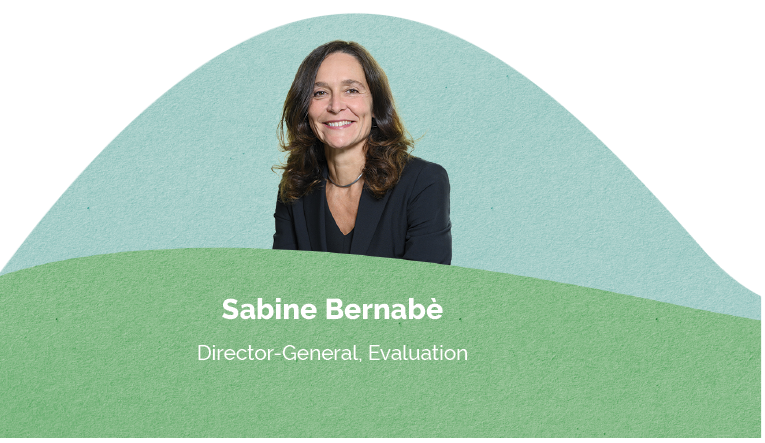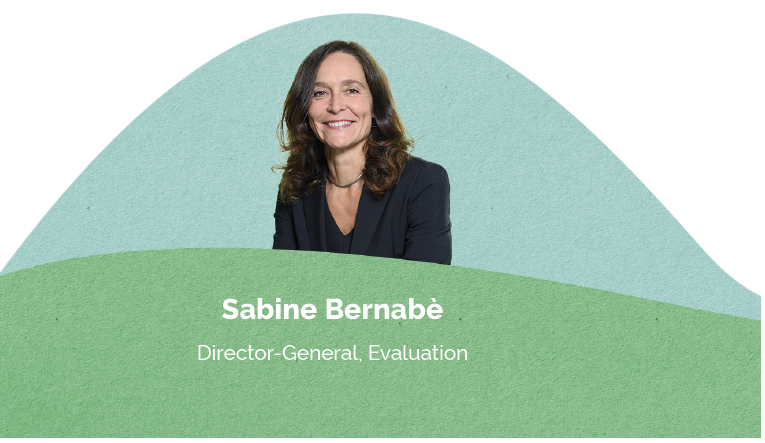Evaluating for People and the Planet
Message from the Vice President and Director-General, Evaluation
With the World Bank adapting to address new challenges and meet new needs, evidence on what is working, why, and for whom will be a vital guide for the way forward. As the new Director-General, Evaluation, I am acutely aware of the important task and confident that the Independent Evaluation Group (IEG) is prepared to fulfill it. Looking back at fiscal year (FY)23, IEG clearly continued to innovate as needed to provide World Bank management with timely evidence and recommendations to inform decisions around pressing issues. Escalating crises—including COVID-19; fragility, conflict, and violence (FCV); and rapidly worsening effects from climate change—demand more and faster responses from international development organizations. IEG supported the World Bank as it established the instruments for rapid responses and launched the process of adapting to the new global context with a work program focused on addressing immediate and longer-term needs. This support included products ranging from two early-stage assessments of the COVID-19 response to a series of summary notes prepared to inform the World Bank’s Evolution Roadmap on convening around global issues, the country-based model, and outcome orientation.
With overlapping global challenges and an accelerating climate crisis shrinking timelines, the World Bank is expanding programs and offering more resources to developing countries. The finite supply of these resources means that IEG’s assessments of relevance, efficiency, and efficacy must be completed faster and in a more targeted manner. To this end, we use a variety of instruments with different timelines to meet the needs for accountability in self-evaluations, learn lessons from specific projects, and generate rigorous evaluative evidence about downstream operational impacts and outcomes. For example, our new product—Evaluation Insight Notes (EINs)—synthesizes findings from IEG’s extensive archive of past evaluative work to address knowledge gaps and inform key strategic and operational issues. FY23 EINs covered domestic revenue mobilization, food security, and support of Indigenous peoples.
A core part of IEG’s mandate is to validate self-evaluation reports from the World Bank, the International Finance Corporation (IFC), and the Multilateral Investment Guarantee Agency (MIGA). IEG also evaluates at the project level, and in FY23, we began work on cluster Project Performance Assessment Reports (PPARs) where findings from several PPARs on projects with commonalities are aggregated in a single report. The data from these validations and project-level evaluations feed into larger thematic evaluations and allow IEG to provide evidence-based recommendations and lessons.
For these larger evaluations, IEG remained focused on long-term development challenges with thematic and sector evaluations that provided insights on critical issues, such as climate change, debt, domestic revenue mobilization, and food security. Evaluations assessed and drew lessons from, among other topics, World Bank support for reducing disaster risks from natural hazards, sustainable farms and agribusiness firms, and the World Bank’s contributions to and use of the Low-Income Country Debt Sustainability Framework. IEG also collaborated with World Bank staff on Learning Engagements, a structured series of activities aimed at absorbing and applying existing evaluative evidence and knowledge. These collaborations included reviewing evidence with the Global Facility for Disaster Reduction and Recovery to inform its Monitoring, Evaluation, and Learning framework; working with the Global Infrastructure team at IFC on a deep dive analysis on climate change projects; and improving World Bank interventions in justice sectors.
It is clear that the achievements of FY23 are part of a longer-term trajectory. The latest external review of IEG, which concluded in October 2022, remarked on the progress in implementing recommendations from the 2015 review to increase the unit’s value. The report noted IEG’s adaptation of synthesis work to provide rapid lessons on emerging topics, emphasis on learning from evaluation, and increased focus on evaluation capacity development. In addition, the stakeholder engagement survey captured positive views of IEG’s alignment with the World Bank’s strategic priorities and the quality of its evaluative work. However, the external review identified areas for improvement, especially regarding the private sector. On the basis of the recommendations, we are striving to improve collaboration and mutual learning among IEG, IFC, and MIGA.
The support for monitoring and evaluation capacity development in client countries continued to expand in FY23. The Global Evaluation Initiative (GEI) grew to have 14 donor partners and more than 20 associate partners working on implementing and delivering programs. GEI’s Centers for Learning on Evaluation and Results (CLEAR) continued to work with governments to improve capacity at the country level. GEI’s network of partners provided their flagship training programs on the fundamentals of evaluation and a variety of professional development opportunities for nearly 3,000 program participants. Support for countries to build the capacities for evidence-informed policies and to monitor progress toward development goals has never been more important as governments navigate concurrent challenges.
In FY23, IEG expanded its dissemination of knowledge on evaluation methods through its Methods Advisory Function’s new series on evaluation methods and broadened its stakeholder reach through the growing GEI network. As the World Bank enters a new era with a new president and a commitment to evolving to meet the needs of developing countries besieged by multiple crises—many exacerbated by climate change—IEG will remain flexible and provide valuable, timely insights based on rigorous evaluations and synthesis of a wealth of existing knowledge.
We have many challenges ahead, but it is a privilege to join IEG as we continue the work of strengthening the relevance and usefulness of IEG for the World Bank and for the evaluation community more broadly.



